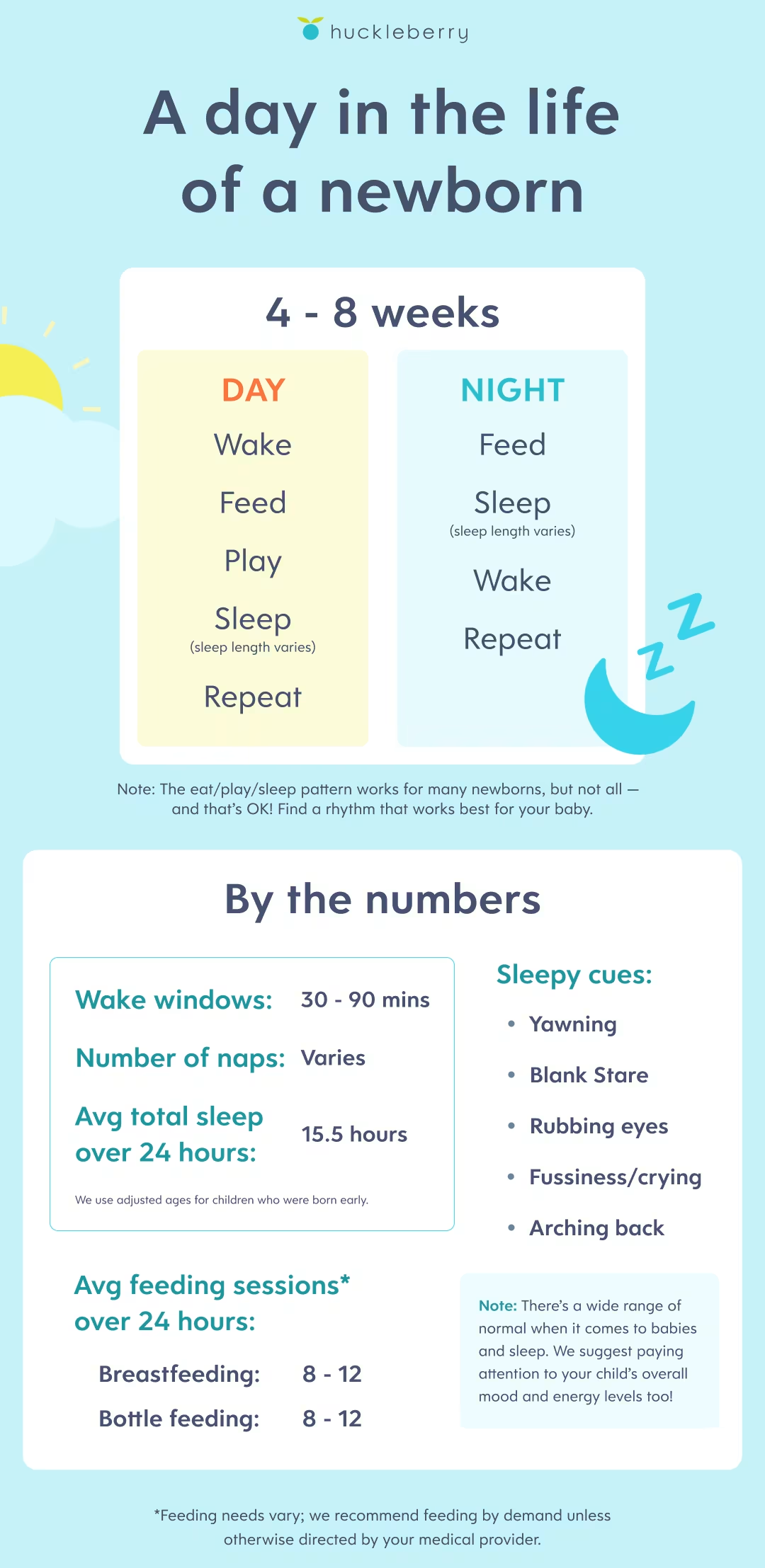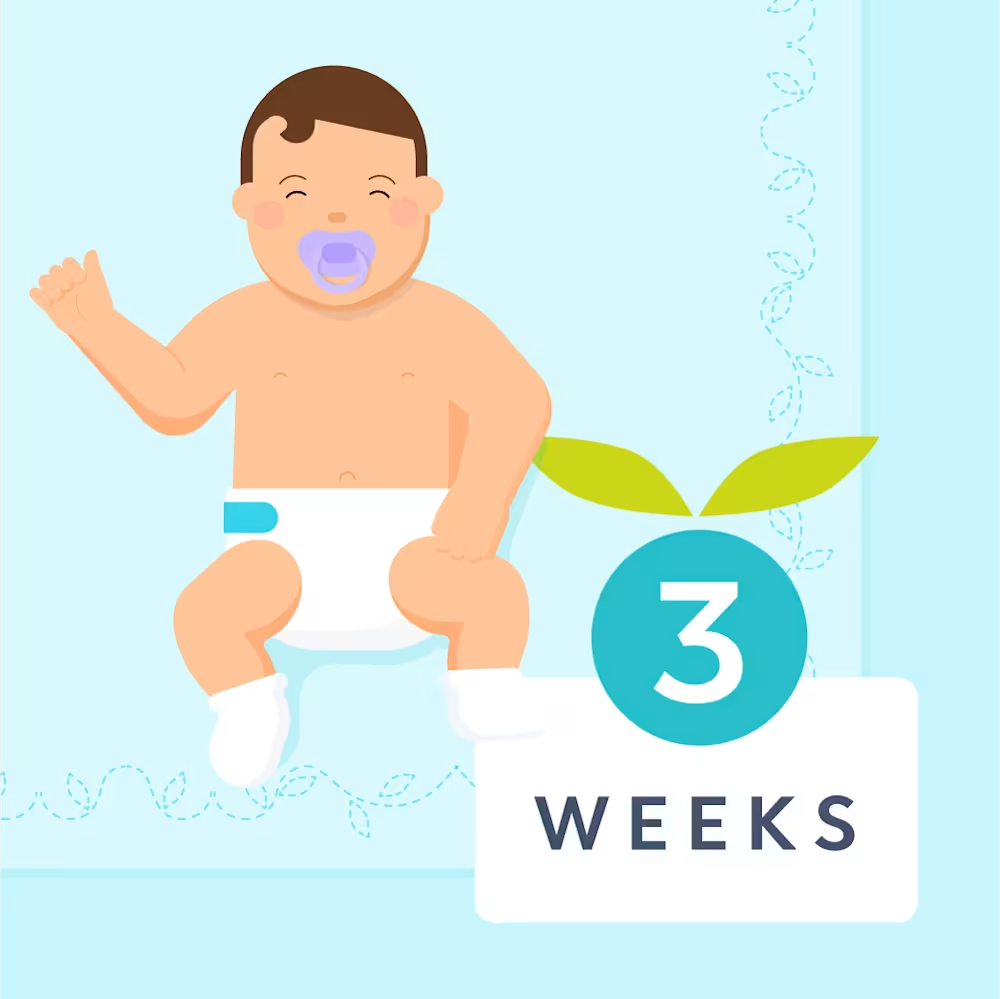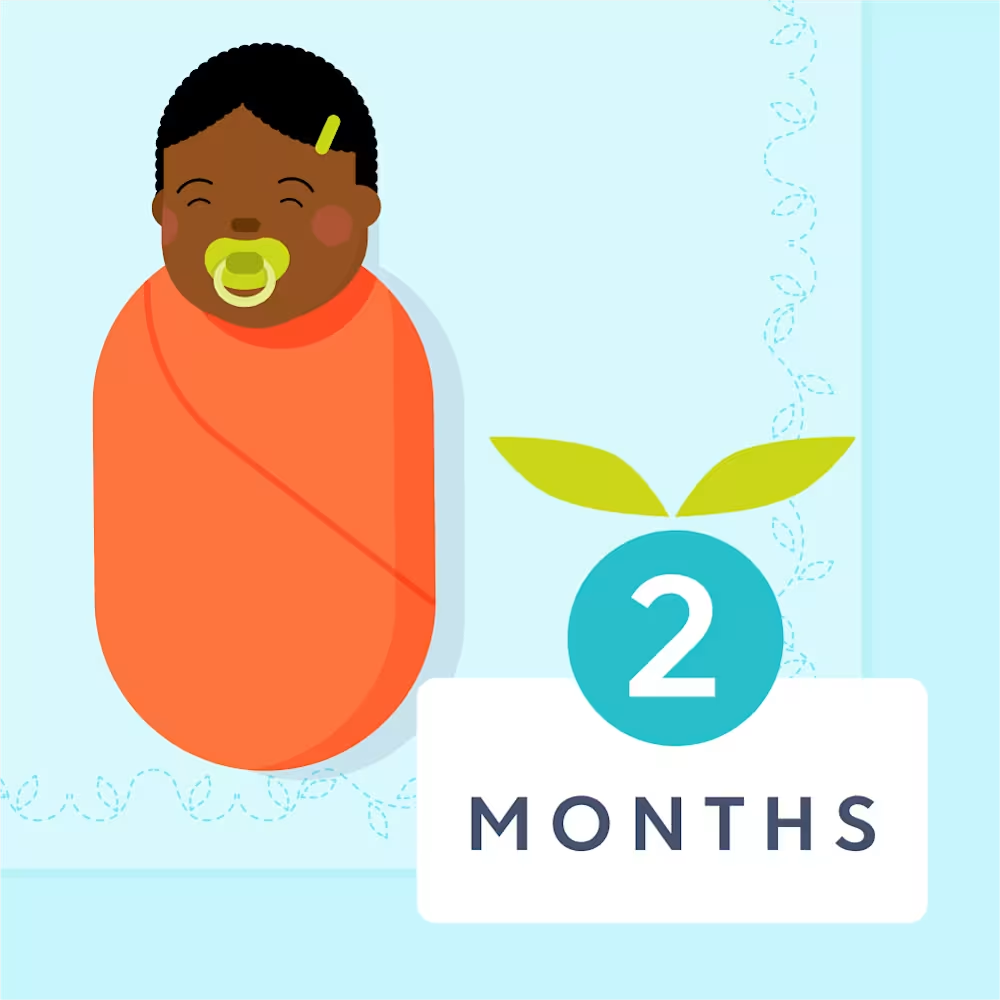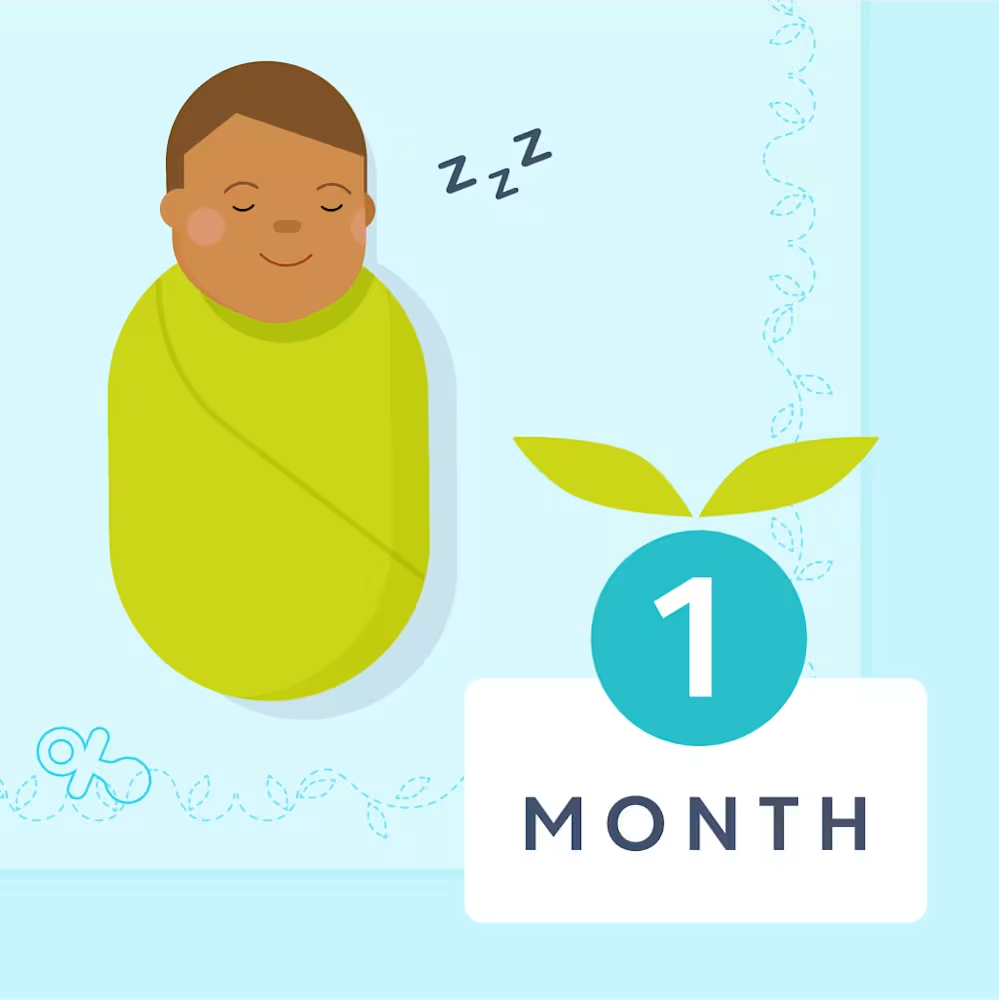5 week old sleep schedule: Bedtime and nap schedule
Updated Dec 15, 2025

At 5 weeks, there’s still not a whole lot of predictability in the sleep department. Naps can be short or long and babies are still expected to wake multiple times overnight for feeds and comfort. While you may be eager for some more structure (and sleep for yourself!), rest assured that you’re doing everything “right” and this is normal behavior for newborns. Your little one will likely settle into a more typical cycle of sleep and eating closer to old.
In this article, we’ll walk you through how much sleep you may expect from your 5 week old and reassure you that your newborn’s chaotic sleep patterns are common for this age group.
How much should a 5 week old sleep?
Newborns usually sleep for about 16 - 17 hours per day, according to the American Academy of Pediatrics []. It’s normal to feel like your baby is still in a pattern of sleeping, waking up to feed and get a diaper change, then it’s practically time for another nap. At 5 weeks, most babies can comfortably stay awake for around 30 - 90 minutes before they need to sleep again.
This cycle may feel chaotic — especially since you never know if a nap will last 30 minutes or 2 hours — but it won’t last forever. After of age, babies usually fall into a more typical 24-hour cycle for sleeping and eating.
Keep in mind that there’s not a magic number when it comes to sleep, especially for newborns. There’s a wide range of normal, so try not to strive for a specific number of hours or naps, especially in these first months. Instead, evaluate your baby’s overall mood and energy levels to determine if they’re getting enough sleep every day.
Here's a quick overview of what you may expect when it comes to 5 week olds and sleep. Note that these figures are averages and should be used as guidelines.
Sample schedule for 5 weeks
At 5 weeks, your little one's "schedule" will likely still be unpredictable. Sleep times and durations will vary and this is normal! Here's what a day in the life of a 5 week old newborn may look like:

Top sleep tips for 5 week old
It can be tricky to determine when your baby needs to sleep again, especially if you’re trying to follow an “eat, play, sleep” routine and it seems like the “play” portion only lasts long enough for some eye contact and then they’re ready to doze off. Try to evaluate whether your little one is ready to sleep again by focusing on and .
At 5 weeks, a typical wake window may be around 30 - 90 minutes before it’s time for more sleep. It’s common for little ones to have their shortest stretch of awake time in the morning. Wake windows often lengthen as the day goes on. Their longest period of awake time may be at the end of the day, before bedtime. If it’s not, that’s OK too!
Along with keeping an eye on the clock, check for sleepy cues like rubbing their eyes or rubbing their face on you, staring off into space, yawning, or becoming fussy. However, these signs can be fleeting and easy to miss, so we recommend offering sleep if your child has been awake for over 1.25 hours and hasn't shown sleepy signs.
Naptime schedule for 5 weeks
How long should a 5 week old nap?
Naps are typically all over the place at 5 weeks — lengths will since babies aren’t born with predictable or organized sleep cycles []. One nap may be 30 minutes and the next could be two hours and both would be considered “normal” at this age.
How many naps for a 5 week old?
A baby's circadian rhythm [, ] is still developing in the first months of life, so we don’t recommend trying to follow a sleep schedule or aiming for a specific number of naps at this point. It’s normal to see long and short naps and plenty of wakings for over a 24-hour period since sleep is influenced by sleep pressure and hunger at 5 weeks.
Bedtime for 5 week olds
What time should a 5 week old go to bed?
Is your baby a night owl? It’s normal for bedtime to be on the late side in the first months of life since newborn schedules are still so irregular. A 5 week old’s longest stretch of sleep in a 24-hour period may start at 9:00 or 10:00 PM — or even later. Your little one may be ready for an earlier bedtime (somewhere between 6:00 and 8:00 PM) at around .
You may get some well-intentioned advice to keep your baby up for longer stretches during the day in hopes of an earlier bedtime and more overnight sleep, but this can backfire and lead to . When a newborn baby is too tired, it can be harder for them to fall asleep and stay asleep versus if they’ve had adequate daytime sleep.
What time should a 1 month old go to bed?
Your baby may have a very late bedtime at this age. Since a newborn’s schedule is irregular at this stage of development, don’t be surprised if the longest stretch of sleep starts at 10:00 PM or even much later. A 1 month old’s sleep schedule will often be on the later side. However, by 3 - 4 months of age, most babies will be ready for an earlier bedtime.
Why does my 5 week old keep waking up at night crying?
It’s expected that babies at this age will wake up overnight for feedings and cuddles. Newborns typically go around 2 - 3 hours between feeds, so it’s completely normal for your little one to wake 2 - 3 times (or more) overnight. While night wakings and feedings can be tiring for caregivers, most babies aren’t typically physiologically capable of until closer to 6 months.
Is there a sleep regression at 5 weeks old?
Newborns don’t experience sleep regressions since their sleep is already irregular in these early months — there aren’t consistent patterns yet to regress from. If your newborn’s sleep suddenly shifts, it’s usually due to growth spurts, cluster feeding, or adapting to life outside the womb rather than a true regression. It’s expected that 5 week old will wake frequently during the day (and night!) at this stage. Little ones don’t develop more predictable 24-hour sleep and feeding cycles until closer to 3 - 4 months.
Can my 5 week old sleep with a pacifier?
Pacifiers are safe to use at 1 month and can generally be introduced from birth. However, if your baby is breastfeeding, the AAP suggests waiting until nursing is well-established, which typically happens around this age []. That said, there is little evidence to confirm that offering a pacifier too early leads to “nipple confusion” [].
In addition to providing comfort, pacifier use may help reduce the risk of sudden infant death syndrome (SIDS). They are also often recommended for preterm or low-birth-weight babies to support the development of their sucking reflex [].
Should I swaddle my 5 week old?
Swaddling a 1 month old baby is often a way to make them feel secure and also promote sleep. Swaddles can help prevent the Moro reflex [] from startling sleeping newborns awake, potentially allowing for a longer rest period.
Some things to remember when swaddling include:
Babies should always be placed on their backs for sleep, whether or not they’re swaddled, per AAP safety guidelines [].
Use “hip-healthy” swaddling techniques, allowing your baby’s legs to bend up and out naturally. This helps reduce the risk of hip dysplasia [].
Stop swaddling your baby as soon as they show any signs of rolling over, which can happen as early as 2 months old.
Can I sleep train a 5 week old?
Sleep training yet. Little ones at this age often need help from a caregiver to fall asleep and stay asleep and that's normal! If you’re looking for ways to help your baby , try some of our for healthy newborn sleep hygiene.
Can a 5 week old sleep on their stomach or side?
A 5 week old should always be placed on their back on a firm, flat surface for sleep — not their stomach or side — per the AAP’s safe sleep guidelines []. Once your baby can comfortably roll both ways (back to front and front to back), you can let them sleep in a different position without returning them to their back.
What are the developmental milestones for a 5 week old?
Although your baby isn’t ready for major motor milestones like sitting or rolling during , there are many other exciting developments to watch for this month:
Regains birth weight by around 2 weeks, then continues to gain weight steadily
Brings hands close to their eyes and mouth
Keeps fists mostly clenched
Shows newborn reflexes such as rooting, sucking, Moro (startle), grasping, and stepping reflexes
Does a 5 week old need to eat during the night?
It’s completely normal for newborns to wake multiple times overnight for feeding and comfort. At this stage, their tiny stomachs can only hold small amounts, requiring frequent feedings both day and night. As your baby grows and their stomach capacity increases, they may begin to sleep longer stretches overnight. However, many babies continue needing nighttime feedings until around 6 months [].
Takeaway
We suggest aiming for around 15.5 hours of total sleep within a 24-hour period for 5 week old babies. Since newborn sleep can be unpredictable, there won’t be a consistent number of naps each day — every day will likely look a little different, and that’s completely normal!
At this age, babies typically stay awake for about 30 - 90 minutes at a time, though this can vary throughout the day and from one day to the next. It may feel like you barely have time to change your baby’s diaper and feed them before they’re ready to sleep again.
Many families find an "eat, play, sleep" routine helpful during the early months. At 1 month, the "play" period might be as simple as a diaper change and a short tummy time session before it's time for another nap.
If you're curious about what lies ahead in the next month, glimpse into the future to see what you might experience once your baby is a . Take a look back at how far your baby has come by revisiting what they may have been like as a .
Share article:
Note: The content on this site is for informational purposes only and should not replace medical advice from your doctor, pediatrician, or medical professional. If you have questions or concerns, you should contact a medical professional.
9 Sources
Share article:







